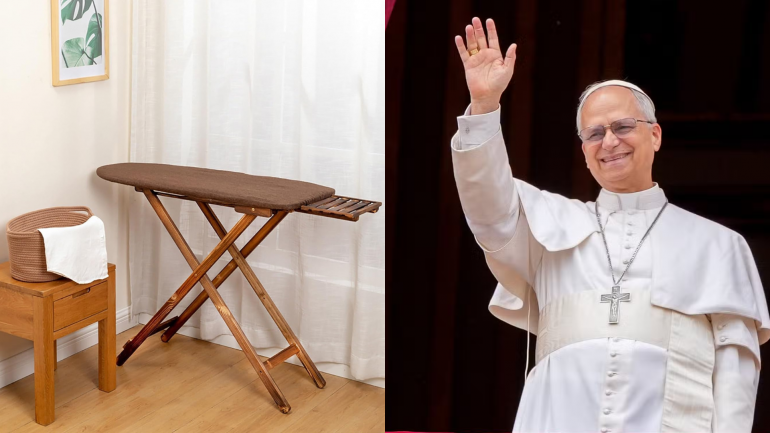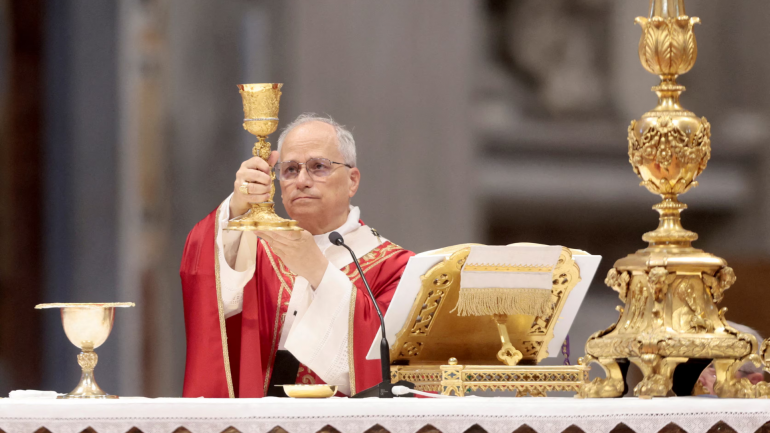The Ironing Board Altar: "Leo from Chicago"

(The Vatican documentary "Leo from Chicago," produced by the Vatican Dicastery for Communications, premiered a few days ago. It traces the life of Pope Leo before he became the pope. In this short review, RVA writer Joshua D’Souza, SJ, analyzes the documentary, exploring its themes and highlighting iconic scenes. The documentary runs for just under an hour and is available on YouTube and other Catholic platforms, including RVA. Focusing especially on the theme of discernment, D’Souza offers a compelling narrative on why it is a must-watch for all Christians, particularly for young people discerning their vocation. – Editor)
There’s a beautiful, almost whimsical scene in the new documentary Leo from Chicago. A young Robert Francis Prevost, the boy who would go on to become Pope Leo XIV, has set up an ironing board in the basement. Draped with a tablecloth, it becomes his altar. His brother John recalls, “He would act as a Priest saying Mass, and didn't consider it playing and took it seriously. He knew all the prayers, both in Latin and English.” This isn’t just a cute childhood anecdote. It is the perfect icon for a vocation rooted in a spirituality that discovers God not in escape, but in the depth of the ordinary. Watching this documentary is less about studying the past life of a pope and more about witnessing a quiet, persistent answer to a question that echoes through the ages: “Lord, what would you have me do?”
St Augustine’s entire spiritual journey was a restless search for a heart that could finally find its rest in God. He looked for God in grand philosophies and fleeting pleasures, only to discover Him in the quiet moments of grace, in the voice of a child, in his own mother’s steadfast prayers. “Leo from Chicago” captures this same spirit. We don’t see dramatic visions; we see a mother attending 6 a.m. Mass daily. We don’t hear a dramatic call from heaven; we see a boy who finds joy in the sacred rhythm of the liturgy, even when celebrated on a household appliance. This is where the documentary makes its most profound point: a vocation is often not a single, earth-shaking moment, but a slow, steady knitting together of one’s deepest loves with the world’s deepest needs.
The documentary beautifully connects this to a core biblical theme: the Call of Samuel. The young Samuel, sleeping in the temple, hears a voice calling his name. He mistakes it for the priest Eli. It takes three times, and Eli’s wisdom for Samuel to understand and respond, “Speak, Lord, for your servant is listening.” Young Leo was that modern Samuel. The voice of God didn’t ring from the heavens; it whispered in the rhythm of the family Rosary, it spoke in the Latin prayers he practised with such seriousness, and it echoed in the peaceful silence of a child who was, as his brother Louis said, “like God’s gift to mothers.” The documentary suggests his vocation was a lifelong act of learning to recognise that voice and to answer, again and again.

One of the documentary’s most powerful scenes unfolds by a riverbank. Confronted by kids threatening to throw their bikes in the river, young Leo didn’t fight or flee. He said, “Let me talk to them.” The tension dissolved into friendship, a lived example of Augustinian peace, “Tranquillitas Ordinis”, where order is restored through dialogue. This moment foreshadowed a lifelong principle: for Leo, theology was never abstract, but about how truth shapes our encounters with others. This conviction led him, a man with a Doctorate in Canon Law, to an unexpected choice. He bypassed prestigious posts for the poor in Peru. The boy who calmed a riverbank conflict became the man who dived into the messy waters of mission, armed not with decrees, but with a listening heart. Is this not the priesthood's essence? The film also offers a humorous, heartfelt touch: his love for driving. A friend quips, “It must be the hardest thing for him, not being able to drive as the Pope.” It’s a light moment that speaks to the “ordo amoris”, the re-ordering of loves. He may have loved the open road, but he loves the flock more.
So, what does this mean for a young person today, feeling that restless tug towards religious life? The documentary offers a gentle, radical answer. You don’t need to be extraordinary. You just need to be attentive. Your “ironing board altar”, that place where your deepest joy meets a simple, sincere response to God, is enough. Your call might not be in a church, but in a basement, on a street, or in the quiet of your own heart.
The film leaves us with a question, one that is both simple and life-altering, perfect for a young person discerning their path or for any of us trying to live a meaningful life:
If God’s call isn’t a shout from a distant mountain, but a whisper in the things you already love and the peace you already bring, are you listening?
Pope Leo’s story suggests that our vocation is hidden in plain sight, in the ordinary, humble, and wonderfully human moments of a life lived with open hands and a listening heart.










God bless you Joshua, in your endeavours . GOD BLESS.
- Reply
Permalink